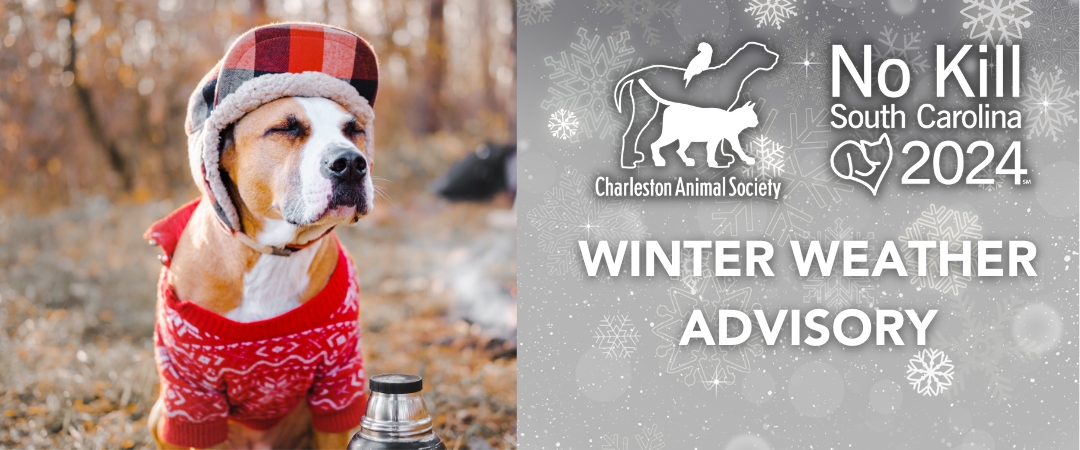SNOWSTORM SAFETY TIPS FOR PETS
Charleston Animal Society Issues Emergency Cold Weather Alert
(NORTH CHARLESTON) – With temperatures expected to dip below freezing across the Lowcountry, Charleston Animal Society is urging pet owners to take precautions to protect companion animals and livestock from the dangers of extreme cold. Follow these tips to keep your furry friends safe:
LIMIT OUTDOOR TIME
Cold weather can catch your pet by surprise, so be sure to limit outdoor activities. Shorten walks for dogs and ensure cats stay indoors, especially during the coldest parts of the day. Frostbite and hypothermia can set in quickly in below-freezing temperatures.
Pets with certain conditions like diabetes, along with older and very young animals, may struggle to regulate their body temperature, so it’s especially important to monitor them closely. Consider using sweaters or coats for dogs with thin fur or small breeds that are particularly susceptible to the cold.
CREATE A WARM HAVEN
If your pet spends time outside, ensure they have access to a warm, dry, and sheltered space, such as an insulated doghouse with bedding that can help retain heat. “Be sure to check bedding regularly, because snow can add a layer of moisture that will make it uncomfortable for your pets,” said Dr. Lucy Fuller, Charleston Animal Society Chief Veterinary Officer.
Livestock and outdoor animals also need protection. Provide plenty of fresh, unfrozen water and ensure that enclosures block wind and precipitation.
WATCH FOR WINTER HAZARDS
Paw pads on animals are resilient, but don’t overdo it with long walks in ice and snow. Be mindful of de-icing salts and chemicals on roads and sidewalks, which can irritate your pet’s paws. Wipe their paws after walks to prevent ingestion of harmful substances.
CARS & CATS
A warm vehicle engine can be an appealing heat source for outdoor and feral cats, but it’s dangerous. Before starting your car, make some noise! Bang on the hood, check underneath the vehicle, and honk the horn to scare off any feline hitchhikers seeking warmth under the hood.
KNOW THE WARNING SIGNS
Watch for signs of cold-related distress in pets, such as shivering, lethargy, whining, or paw lifting. If you notice these symptoms, bring your pet indoors immediately and consult a veterinarian if their condition worsens.
REPORT ANIMALS IN NEED
If you are concerned about an animal left out in the cold, don’t hesitate to call your local animal control agency or report it to law enforcement. Animals left outside without adequate shelter or care may be at risk of serious injury or death.
By taking these steps, you can help ensure your pets and other animals stay safe, healthy, and comfortable during this cold snap.
INTERVIEWS AVAILABLE UPON REQUEST



